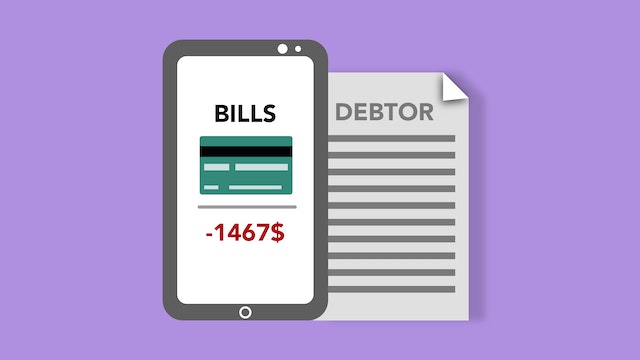It’s no secret that young people are often laden with debt. From student loans to credit card bills, it seems like there’s never enough money to go around.
If you’re struggling to get your finances in order, don’t worry – you’re not alone.
Your Debt Expert has provided below their top tips on how you can improve your financial health right now!
Through IVAs and other debt solutions, Your Debt Expert helps hundreds beat debt.
If you’re struggling, make sure to visit their site for information on mortgages to council tax and advice on bailiffs taking your belongings for someone else’s debt. (Find out more HERE)
The sooner you start taking steps to improve your financial health, the better off you’ll be in the long run. Here are 10 tips to help get you started.
1. Make a budget and stick to it
 Making a budget is one of the most important things you can do to improve your financial health. By determining your income and expenses, you can get a clear picture of where your money is going and identify areas where you can cut back. tracking your spending will also help you to stick to your budget and ensure that you are making progress toward your financial goals. While it takes some effort to create and maintain a budget, it is well worth the effort to achieve financial stability.
Making a budget is one of the most important things you can do to improve your financial health. By determining your income and expenses, you can get a clear picture of where your money is going and identify areas where you can cut back. tracking your spending will also help you to stick to your budget and ensure that you are making progress toward your financial goals. While it takes some effort to create and maintain a budget, it is well worth the effort to achieve financial stability.
2. Pay off your debt
 If you are carrying any debt, it is important to focus on paying it off as quickly as possible. The interest charged on debt can add up quickly, making it difficult to get ahead financially. In addition, the stress of having debt can take a toll on your mental and emotional health. If you are struggling to make payments, consider consolidating your debt or speaking with a financial advisor to develop a plan to get out of debt.
If you are carrying any debt, it is important to focus on paying it off as quickly as possible. The interest charged on debt can add up quickly, making it difficult to get ahead financially. In addition, the stress of having debt can take a toll on your mental and emotional health. If you are struggling to make payments, consider consolidating your debt or speaking with a financial advisor to develop a plan to get out of debt.
3. Build up your savings
 It is important to have money set aside for unexpected expenses and for your long-term goals, such as retirement. If you don’t have any savings, start by setting aside a small amount each month. Making savings can be easily achieved by spending less with special deals, coupons and vouchers from your favourite retailers. Once you have built up a cushion, you can begin to invest your savings so that they can grow over time.
It is important to have money set aside for unexpected expenses and for your long-term goals, such as retirement. If you don’t have any savings, start by setting aside a small amount each month. Making savings can be easily achieved by spending less with special deals, coupons and vouchers from your favourite retailers. Once you have built up a cushion, you can begin to invest your savings so that they can grow over time.
4. Invest in yourself
 Investing in your own education and personal development is one of the best things you can do for your financial health. When you improve your skills and knowledge, you are more likely to get a better-paying job and earn more money over your lifetime. In addition, investing in yourself can help you to achieve your personal and professional goals, which can lead to a more fulfilling life.
Investing in your own education and personal development is one of the best things you can do for your financial health. When you improve your skills and knowledge, you are more likely to get a better-paying job and earn more money over your lifetime. In addition, investing in yourself can help you to achieve your personal and professional goals, which can lead to a more fulfilling life.
5. Live below your means
 One of the best ways to improve your financial health is to live below your means. This means spending less money than you earn and saving the rest. When you live below your means, you are less likely to accumulate debt and you will have more money available to save and invest. If you are struggling to live below your means, try cutting back on your expenses or increasing your income.
One of the best ways to improve your financial health is to live below your means. This means spending less money than you earn and saving the rest. When you live below your means, you are less likely to accumulate debt and you will have more money available to save and invest. If you are struggling to live below your means, try cutting back on your expenses or increasing your income.
6. Stay disciplined with your spending
 When it comes to improving your financial health, discipline is key. You need to be disciplined to stick to your budget and make progress towards your financial goals. It can be difficult to say no to yourself when you want to buy something, but if it is not in your budget, you need to resist the temptation. When you can control your spending, you will be on your way to financial success.
When it comes to improving your financial health, discipline is key. You need to be disciplined to stick to your budget and make progress towards your financial goals. It can be difficult to say no to yourself when you want to buy something, but if it is not in your budget, you need to resist the temptation. When you can control your spending, you will be on your way to financial success.
7. Invest in your future
 Investing in your future is one of the smartest things you can do for your financial health. When you invest, you are putting your money into something that has the potential to grow over time. This can help you to reach your financial goals and enjoy a comfortable retirement. In addition, investing can provide you with peace of mind and security in knowing that you have a nest egg to fall back on if something unexpected happens.
Investing in your future is one of the smartest things you can do for your financial health. When you invest, you are putting your money into something that has the potential to grow over time. This can help you to reach your financial goals and enjoy a comfortable retirement. In addition, investing can provide you with peace of mind and security in knowing that you have a nest egg to fall back on if something unexpected happens.
8. Create a financial plan
 Creating a financial plan is one of the most important steps you can take to improve your financial health. A financial plan will help you to set goals and track your progress. It can also help you to make informed decisions about your money so that you can achieve your financial goals. If you are not sure where to start, there are many resources available to help you create a financial plan.
Creating a financial plan is one of the most important steps you can take to improve your financial health. A financial plan will help you to set goals and track your progress. It can also help you to make informed decisions about your money so that you can achieve your financial goals. If you are not sure where to start, there are many resources available to help you create a financial plan.
9. Make smart choices with your money
 When it comes to improving your financial health, it is important to make smart choices with your money. This means being mindful of your spending and making decisions that are in your best interest. For example, you may want to consider investing in a retirement account so that you can enjoy a comfortable retirement. Or you may want to save up for a down payment on a house so that you can live debt-free also by utilising home grants. Whatever your financial goals may be, it is important to make choices that will help you to achieve them.
When it comes to improving your financial health, it is important to make smart choices with your money. This means being mindful of your spending and making decisions that are in your best interest. For example, you may want to consider investing in a retirement account so that you can enjoy a comfortable retirement. Or you may want to save up for a down payment on a house so that you can live debt-free also by utilising home grants. Whatever your financial goals may be, it is important to make choices that will help you to achieve them.
10. Be patient
 Improving your financial health takes time and it is important to be patient. You may not see results overnight, but if you are consistent with your efforts, you will eventually see progress. It is also important to keep in mind that there will be setbacks along the way. The important thing is to not give up and to keep working towards your goals.
Improving your financial health takes time and it is important to be patient. You may not see results overnight, but if you are consistent with your efforts, you will eventually see progress. It is also important to keep in mind that there will be setbacks along the way. The important thing is to not give up and to keep working towards your goals.
In conclusion, following these tips will help improve your financial health. However, it is important to remember that personal finance is a journey and there is no one-size-fits-all solution. What works for one person may not work for another. The most important thing is to find what works for you and to stick with it. Financial success takes time, but it is achievable if you are willing to put in the work.




